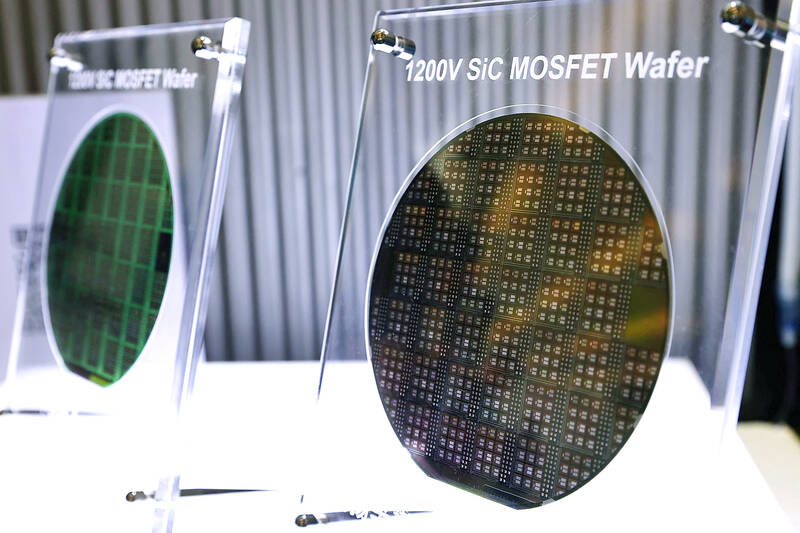Taiwan Semiconductor Manufacturing Co (TSMC, 台積電) is expected to drive growth in the global pure-play wafer foundry industry next year, Taipei-based market information advisory firm TrendForce Corp (集邦科技) said on Thursday.
The chipmaker is expected to benefit from its efforts to develop an advanced 3-nanometer process, on which it is scheduled to start mass production later this year, TrendForce senior semiconductor analyst Joanne Chiao (喬安) said at a technology forum in Taipei, adding that chips made using the process should command a higher profit margin.
Although the global pure-play wafer foundry industry has been undertaking inventory adjustments due to weakening demand, TSMC is expected to weather headwinds on the back of an increase in product prices, with the 3-nanometer process expected to make a significant contribution to its sales next year, when the firm is estimated to see its revenue rise 7 to 9 percent from this year, Chiao said.

Photo: Ann Wang, Reuters
A trial run of the 3-nanometer process began last year, while its 5-nanometer process is the latest technology for which it has launched mass production. Chips made using the technology accounted for 21 percent of TSMC’s total sales in the second quarter of this year.
An upgrade of the trialed process, dubbed 3-nanometer enhanced, is expected to first be used for commercial production next year.
On the back of TSMC’s growth, the global wafer foundry industry is expected to grow about 2.7 percent next year, moderating from an expected 28 percent increase this year, TrendForce said.
The global wafer foundry industry has been at a cyclical peak since 2020, when sales grew 24 percent from a year earlier, and year-on-year growth even hit 26.1 percent last year, Chiao said.
Demand weakness in the global wafer foundry sector has been a result of rapid inflation worldwide and China’s “zero COVID-19” policy, while US sanctions on the exportation of IC and related production equipment to China are expected to have an adverse effect on the global semiconductor industry, she said.
Although many countries are pushing for projects to build their own fabs, Taiwan’s lead over its peers in sophisticated process development should ensure its dominance in the global market for the foreseeable future, Chiao said.
However, as an increasing number of fabs are expected to start producing chips, an increase in supply is expected to present semiconductor producers with new challenges, she added.
Meanwhile, TrendForce Center for Research Operations chief operating officer Locke Chang (張小彪) said he remains cautious about the business outlook for global chip manufacturing next year.
There is no sign that inflation in the US and Europe can be brought under control in the near future, and China’s economy has been slowing amid its strict COVID-19 restrictions, which have created uncertainties in the global economy, Chang said.

Vincent Wei led fellow Singaporean farmers around an empty Malaysian plot, laying out plans for a greenhouse and rows of leafy vegetables. What he pitched was not just space for crops, but a lifeline for growers struggling to make ends meet in a city-state with high prices and little vacant land. The future agriculture hub is part of a joint special economic zone launched last year by the two neighbors, expected to cost US$123 million and produce 10,000 tonnes of fresh produce annually. It is attracting Singaporean farmers with promises of cheaper land, labor and energy just over the border.

US actor Matthew McConaughey has filed recordings of his image and voice with US patent authorities to protect them from unauthorized usage by artificial intelligence (AI) platforms, a representative said earlier this week. Several video clips and audio recordings were registered by the commercial arm of the Just Keep Livin’ Foundation, a non-profit created by the Oscar-winning actor and his wife, Camila, according to the US Patent and Trademark Office database. Many artists are increasingly concerned about the uncontrolled use of their image via generative AI since the rollout of ChatGPT and other AI-powered tools. Several US states have adopted

A proposed billionaires’ tax in California has ignited a political uproar in Silicon Valley, with tech titans threatening to leave the state while California Governor Gavin Newsom of the Democratic Party maneuvers to defeat a levy that he fears would lead to an exodus of wealth. A technology mecca, California has more billionaires than any other US state — a few hundred, by some estimates. About half its personal income tax revenue, a financial backbone in the nearly US$350 billion budget, comes from the top 1 percent of earners. A large healthcare union is attempting to place a proposal before

KEEPING UP: The acquisition of a cleanroom in Taiwan would enable Micron to increase production in a market where demand continues to outpace supply, a Micron official said Micron Technology Inc has signed a letter of intent to buy a fabrication site in Taiwan from Powerchip Semiconductor Manufacturing Corp (力積電) for US$1.8 billion to expand its production of memory chips. Micron would take control of the P5 site in Miaoli County’s Tongluo Township (銅鑼) and plans to ramp up DRAM production in phases after the transaction closes in the second quarter, the company said in a statement on Saturday. The acquisition includes an existing 12 inch fab cleanroom of 27,871m2 and would further position Micron to address growing global demand for memory solutions, the company said. Micron expects the transaction to